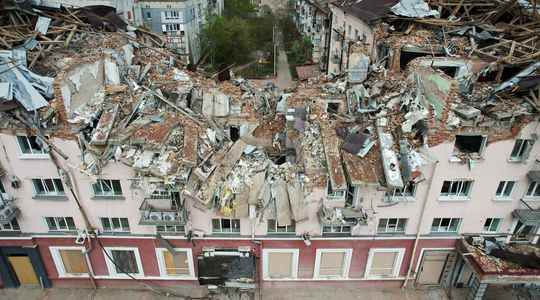Blood continues to spill in Mariupol, a besieged city in southern Ukraine. On the 70th day of its invasion, the Russian army nibbles every inch of the port city and approaches the last bastion of Ukrainian resistance: the Azovstal steelworks where it is entrenched. An offensive with tanks and infantry was launched on Tuesday after the evacuation of civilian refugees from the factory by the United Nations.
- Towards a European embargo on Russian oil
The European Commission is expected to propose a sixth sanctions package on Tuesday providing for a timetable for gradually stopping Russian oil imports, which account for 30% of European Union oil imports. “We will gradually give up Russian deliveries of crude oil within six months and those of refined products by the end of the year”, detailed Ursula von der Leyen, the President of the European Commission, before MEPs in Strasbourg this Wednesday morning.
An exemption for Hungary and Slovakia is under consideration. These two landlocked countries could continue their supplies from Russia during the year 2023, said a European official.
The new sanctions will also concern “the banking sector, there will be other Russian banks which will come out of Swift”, specified the high representative of the EU for foreign affairs, Josep Borrell, in reference to the interbank system which makes it possible to communicate quickly and securely on transactions. Several European diplomatic sources had indicated last weekend that the most important Russian bank, Sberbank, which represents 37% of the market, should thus be excluded from Swift.
- Assault on Azovstal in Mariupol reportedly injured 10 civilians already
It is a “powerful assault”, confides the deputy commander, Sviatoslav Palamar, of the Ukrainian regiment which defends the Azovstal factory. The Russian army and pro-Russian forces on Tuesday launched an attack involving tanks and an amphibious landing on what is emerging as the last pocket of local resistance. Several bombings took place during the night, killing two women and injuring “about 10 civilians”, still according to the deputy commander.
A spokesman for the Russian Ministry of Defense, Vadim Astafiev, had announced earlier on Tuesday the intervention of units of the Russian army and the Donetsk People’s Republic, using artillery and aircraft, with the aim of destroy the firing positions of rival fighters.
- 101 civilians evacuated from the factory
A little earlier in the day, the UN announced the evacuation of a hundred civilians cut off from the Azovstal steelworks, thanks to an operation started last weekend. The refugees arrived in Zaporizhia, 230 kilometers northwest of Mariupol, on Tuesday, where they were welcomed by representatives of the international organization. “I am happy and relieved to confirm that 101 civilians have been successfully evacuated,” UN Humanitarian Coordinator for Ukraine Osnat Lubrani said in a statement.
- Russian boycott of the UN Security Council
It’s a rare gesture. Russia has announced that it wants to boycott a meeting of the UN Security Council with the Political and Security Committee (PSC) of the European Union, illustrating the deterioration of relations between Moscow and partners in the United Nations which continues.
While Russia has repeatedly brandished the threat of nuclear or global confrontation, Russian leader Vladimir Putin has called on French President Emmanuel Macron to interrupt the delivery of military equipment to Ukraine. Evidence of tension in Moscow: a Western diplomat told AFP that he had no recollection of a Russian boycott of a Security Council meeting since the invasion of Ukraine on February 24.
- Pope Francis willing to meet Putin
In an interview with the Italian daily Corriere della Sera, published on Tuesday, Pope Francis claims to have proposed to Russian President Vladimir Putin to meet him. “Twenty days after the start of the war, I asked Cardinal Parolin to send Putin the message that I was ready to go to Moscow,” said the pope to the transalpine media before continuing. “We haven’t had an answer yet and we continue to insist, although I fear that Putin cannot and will not participate in this meeting at this time,” he added.
- The skirmish between Israel and Moscow continues
On Tuesday, the Kremlin accused Israel of “supporting the neo-Nazi regime in kyiv” in a statement. A statement that follows an escalation of tensions between the two diplomats after the Russian Foreign Minister claimed that Hitler “had Jewish blood”, supporting the comparison with Volodymyr Zelensky. The resumption of this conspiracy theory has generated a strong reaction from his Israeli counterpart who speaks of “scandalous, unforgivable and a horrible historical error”.
The Russian ambassador to Israel was summoned for clarification. However, Moscow repeated its accusations Moscow by assuring that the country led by Naftali Bennett “supports the neo-Nazi regime in kyiv”, driving a nail which had already pierced the wood.
